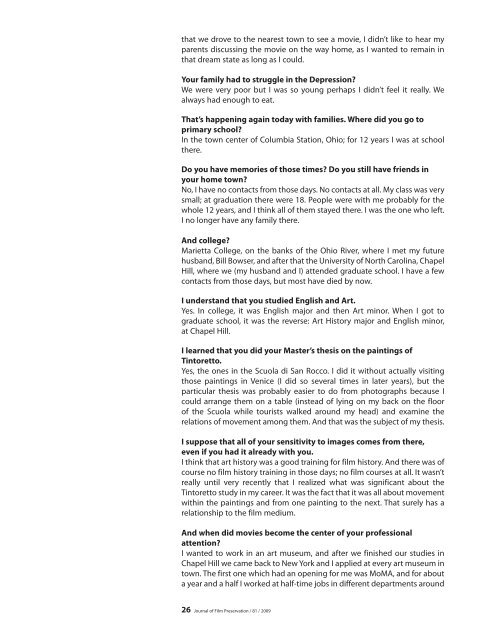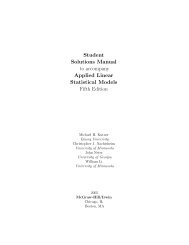Journal of Film Preservation - FIAF
Journal of Film Preservation - FIAF
Journal of Film Preservation - FIAF
Create successful ePaper yourself
Turn your PDF publications into a flip-book with our unique Google optimized e-Paper software.
that we drove to the nearest town to see a movie, I didn’t like to hear my<br />
parents discussing the movie on the way home, as I wanted to remain in<br />
that dream state as long as I could.<br />
Your family had to struggle in the Depression?<br />
We were very poor but I was so young perhaps I didn’t feel it really. We<br />
always had enough to eat.<br />
That’s happening again today with families. Where did you go to<br />
primary school?<br />
In the town center <strong>of</strong> Columbia Station, Ohio; for 12 years I was at school<br />
there.<br />
Do you have memories <strong>of</strong> those times? Do you still have friends in<br />
your home town?<br />
No, I have no contacts from those days. No contacts at all. My class was very<br />
small; at graduation there were 18. People were with me probably for the<br />
whole 12 years, and I think all <strong>of</strong> them stayed there. I was the one who left.<br />
I no longer have any family there.<br />
And college?<br />
Marietta College, on the banks <strong>of</strong> the Ohio River, where I met my future<br />
husband, Bill Bowser, and after that the University <strong>of</strong> North Carolina, Chapel<br />
Hill, where we (my husband and I) attended graduate school. I have a few<br />
contacts from those days, but most have died by now.<br />
I understand that you studied English and Art.<br />
Yes. In college, it was English major and then Art minor. When I got to<br />
graduate school, it was the reverse: Art History major and English minor,<br />
at Chapel Hill.<br />
I learned that you did your Master’s thesis on the paintings <strong>of</strong><br />
Tintoretto.<br />
Yes, the ones in the Scuola di San Rocco. I did it without actually visiting<br />
those paintings in Venice (I did so several times in later years), but the<br />
particular thesis was probably easier to do from photographs because I<br />
could arrange them on a table (instead <strong>of</strong> lying on my back on the floor<br />
<strong>of</strong> the Scuola while tourists walked around my head) and examine the<br />
relations <strong>of</strong> movement among them. And that was the subject <strong>of</strong> my thesis.<br />
I suppose that all <strong>of</strong> your sensitivity to images comes from there,<br />
even if you had it already with you.<br />
I think that art history was a good training for film history. And there was <strong>of</strong><br />
course no film history training in those days; no film courses at all. It wasn’t<br />
really until very recently that I realized what was significant about the<br />
Tintoretto study in my career. It was the fact that it was all about movement<br />
within the paintings and from one painting to the next. That surely has a<br />
relationship to the film medium.<br />
And when did movies become the center <strong>of</strong> your pr<strong>of</strong>essional<br />
attention?<br />
I wanted to work in an art museum, and after we finished our studies in<br />
Chapel Hill we came back to New York and I applied at every art museum in<br />
town. The first one which had an opening for me was MoMA, and for about<br />
a year and a half I worked at half-time jobs in different departments around<br />
26 <strong>Journal</strong> <strong>of</strong> <strong>Film</strong> <strong>Preservation</strong> / 81 / 2009
















